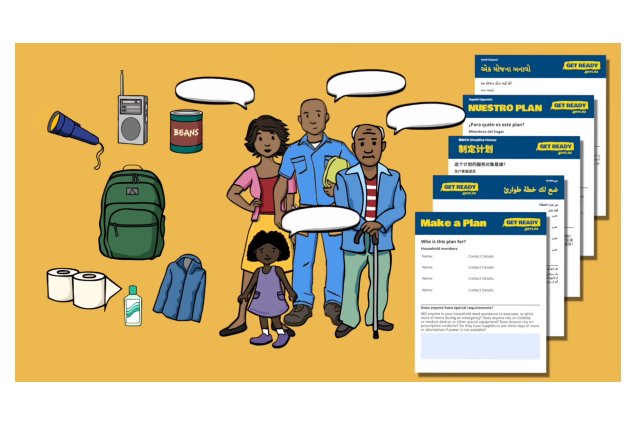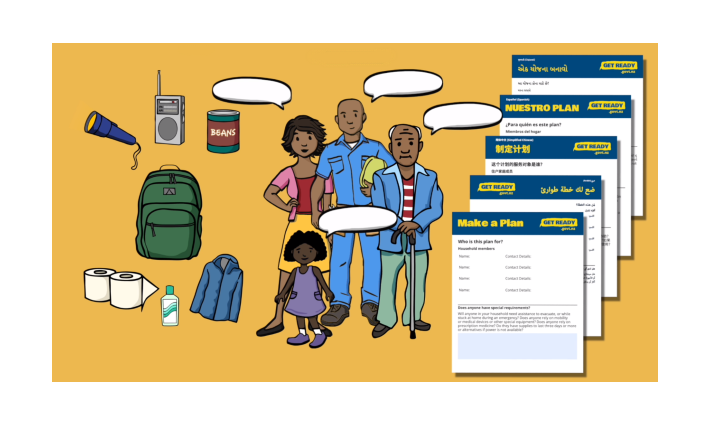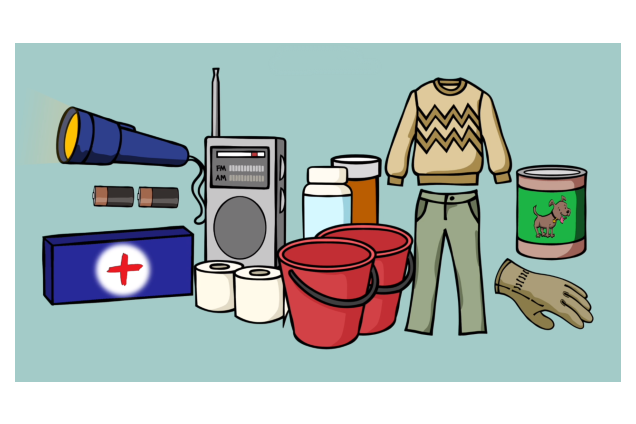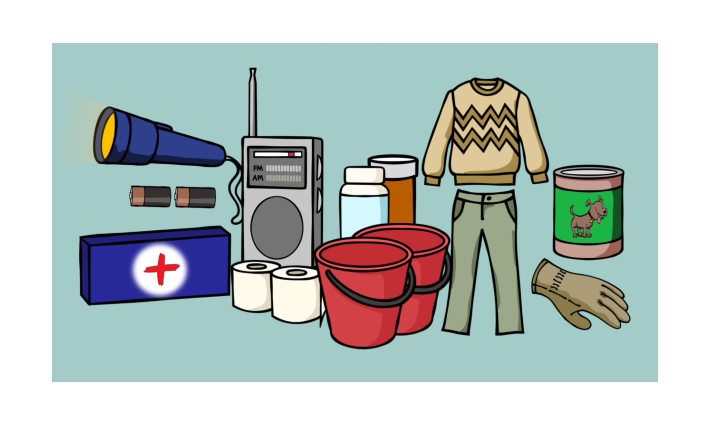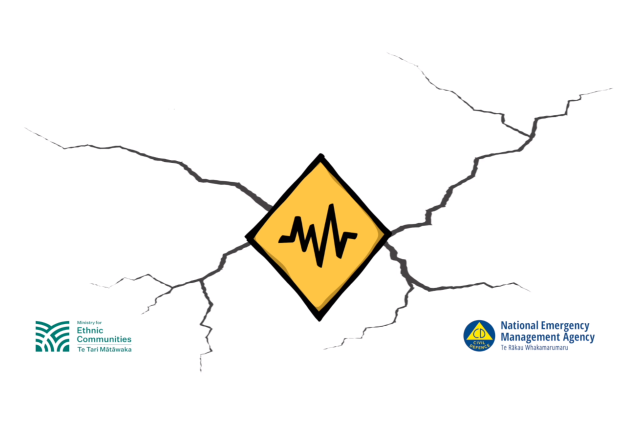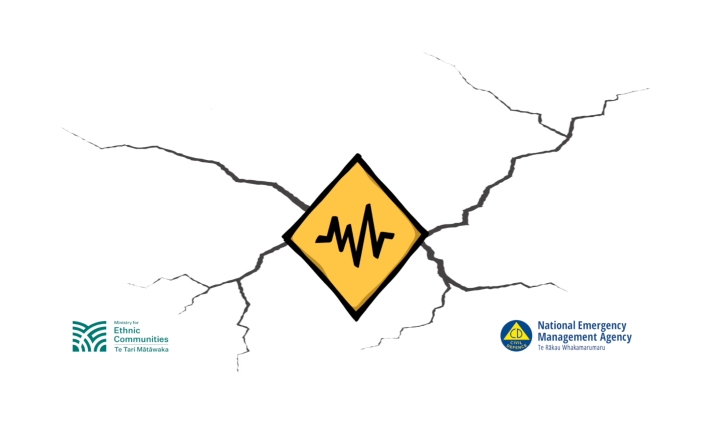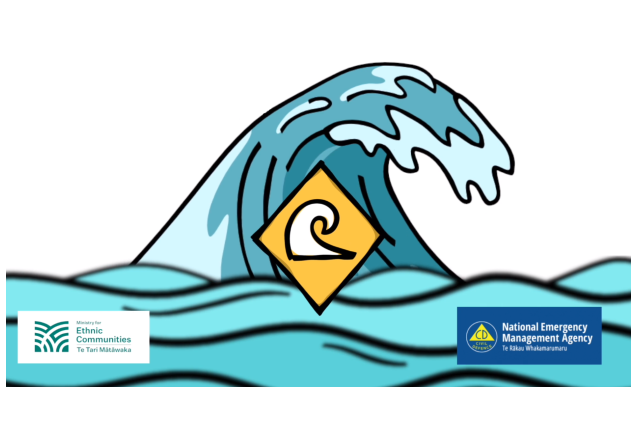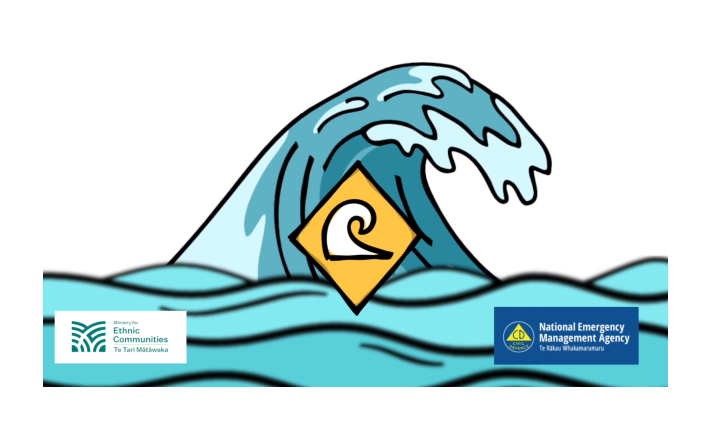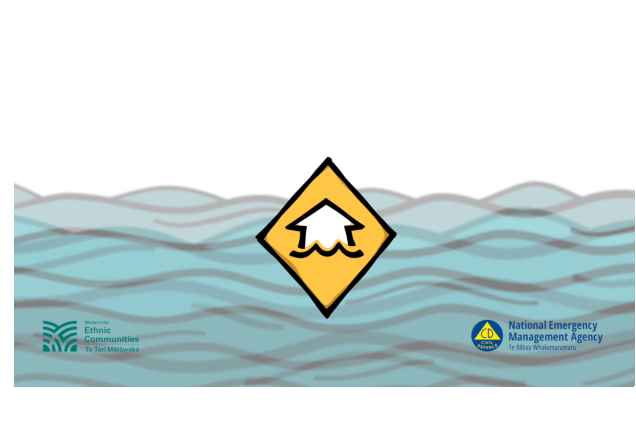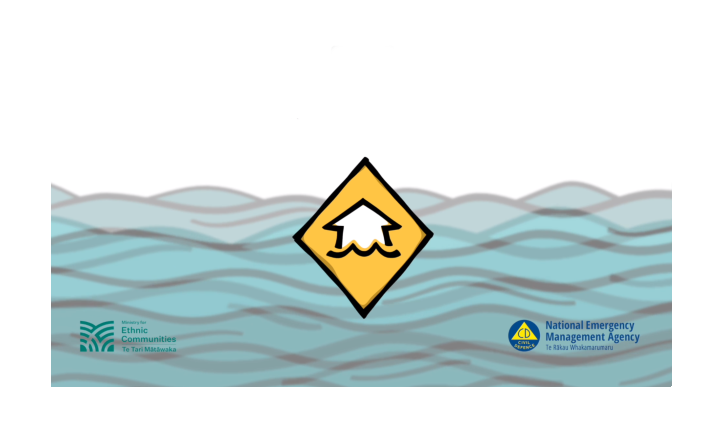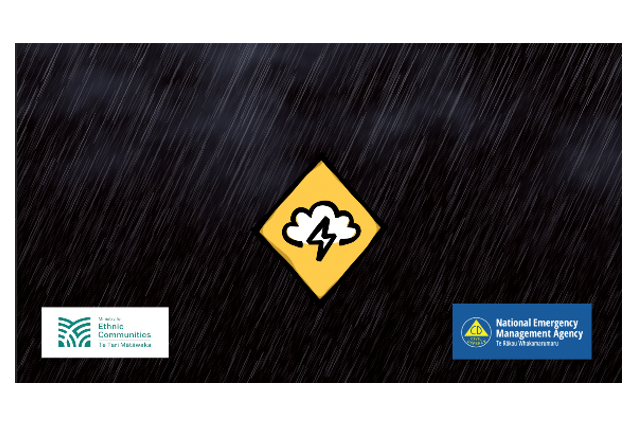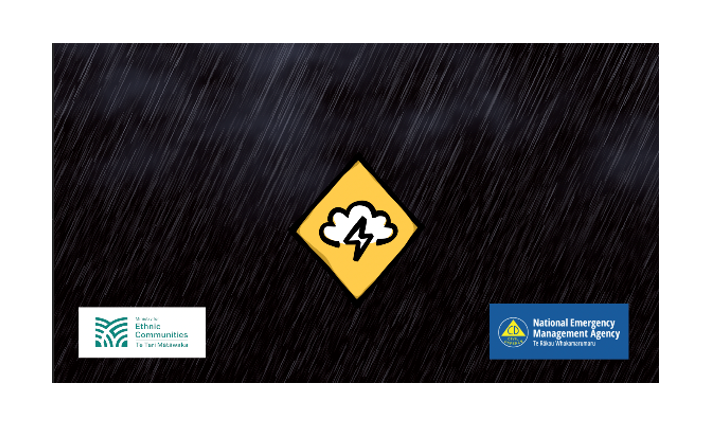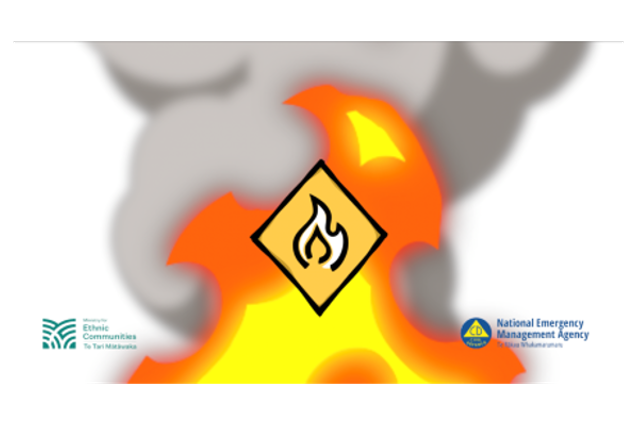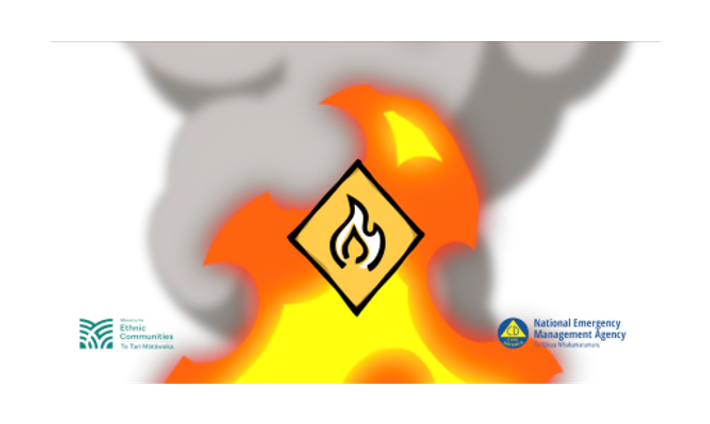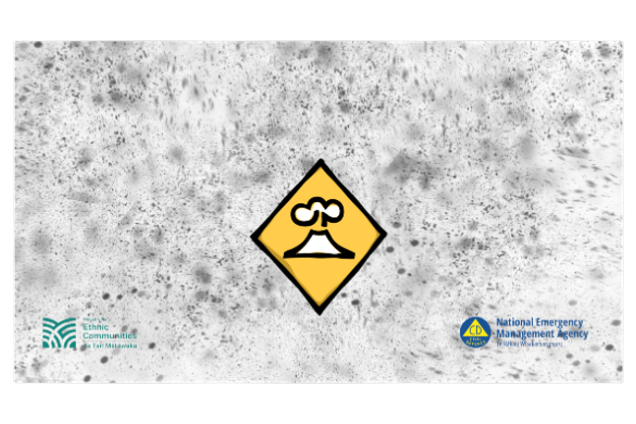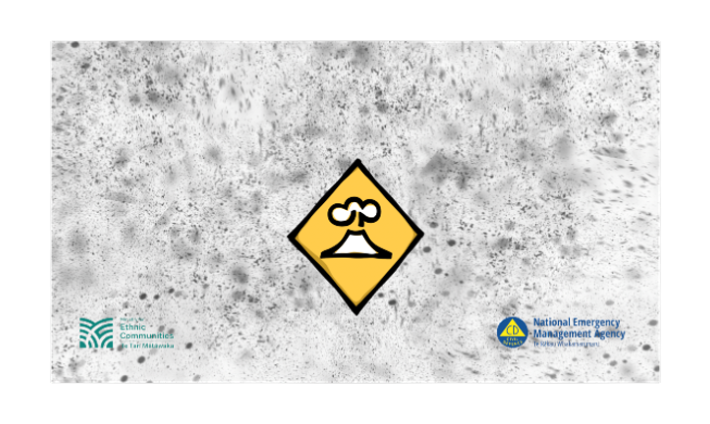On this page
Videos
-
Making an emergency plan
This video explains how to make an emergency plan.
Watch this video -
What you will need in an emergency
This video explains what you’ll need in an emergency.
Watch this video -
What to do in an earthquake
This video explains what to do in an earthquake.
Watch this video -
What to do in a tsunami
This video explains what to do in a tsunami.
Watch this video -
What to do in a flood
This video explains what to do in a flood.
Watch this video -
What to do in a storm
This video explains what to do in a storm.
Watch this video -
What to do in a fire
This video explains what to do in a fire.
Watch this video -
What to do during volcanic activity
This video explains what do during volcanic activity.
Watch this video
Video transcripts
Find the transcripts for our emergency preparedness and response videos.
-
The Ministry for Ethnic Communities and the National Emergency Management Agency have worked together to create this series of videos, so our communities know what to do to prepare for different disasters and emergencies, and how to respond when they happen.
Emergencies can happen anytime, anywhere. This could include earthquakes, floods, storms, tsunami, fires, and volcanic activity.
When an emergency happens, Civil Defence and emergency services will be busy helping the people who need them most so it’s important that you have a plan to look after yourself and your family.
This video explains how to make an emergency plan.
It’s up to you to make sure your household knows what to do and that you have what you need to get through an emergency. Talk with the people you live with and make an emergency plan for different situations.
In an emergency, you could be without power, water, phone, or internet. You also may need to evacuate, be unable to get home, or be stuck at home. Plan for all these scenarios. For example, if you do need to evacuate your home, think about the essential things you will need to do and take with you. Also consider the things you need every day and work out what you would do if you didn't have them.
If you are not at home when a disaster or emergency happens make sure you have a designated meeting place for you and your family. Roads could be closed, and public transport might not be operating so be sure to have an alternative way of getting home, and have a plan to pick kids up from school.
You can find an English version and translated versions of the emergency plan template at www.getready.govt.nz/plan-translations.
For more information about preparing for and responding to emergencies, go to www.getready.govt.nz
Remember, if you need to contact Government services in an emergency and need language support, you can request an interpreter.
-
The Ministry for Ethnic Communities and the National Emergency Management Agency have worked together to create this series of videos, so our communities know what to do to prepare for different disasters and emergencies, and how to respond when they happen.
Emergencies can happen anytime, anywhere. This could include earthquakes, floods, storms, tsunami, fires, and volcanic activity.
When an emergency happens, Civil Defence and emergency services will be busy helping the people who need them most so it’s important that you have a plan to look after yourself and your family.
This video explains what you’ll need in an emergency.
You may be stuck at home with no power, water, or access to food for several days in an emergency. Or, you might not be able to get home, so make sure you have the supplies you need to get through in places you spend a lot of time such as work or school.
You should have food you don’t have to cook. Plan to eat fridge and freezer food first as this will be the safest time to eat it. And if you’re able, share supplies with your neighbours. You might be able to work together to get through. If you have special dietary needs, make sure you have enough food to last three days at home. If you need to evacuate, emergency shelters may not have the food that you need so be prepared to take it with you.
You’ll need at least nine litres of water for every person which will last for three days or more. This will be enough for drinking and basic hygiene.
You’ll also need a torch with spare batteries and a solar or battery powered radio, a spare supply of medicines, first-aid kit, warm clothing, and food for your pets. Ensure you also have work gloves, a properly fitted P2 or N95 mask, toilet paper & large plastic buckets for an emergency toilet. You don’t have to have everything in one place, but you may need to find it in the dark so make sure it’s easy to find and access.
As well as these essential supplies, make sure you also have a grab bag at places you most often spend time like home, your car or work. A grab bag is a small bag with essential supplies. In a grab bag you should have walking shoes, warm clothes, a raincoat, a hat, water, and snack food. Remember this for babies and pets too. Your grab bag should also contain hand sanitiser, a portable phone charger, cash, and copies of important documents along with copies of photo ID. Finally, your grab bag needs to have any medication you might need and a first aid kit, a mask or face covering, and a torch & radio both with spare batteries.
If you need to drive in extreme conditions, you may want to have a brush and shovel, tire chains, windshield scrapers, and warm clothing in your car.
For more information about preparing for and responding to emergencies, go to www.getready.govt.nz
Remember, if you need to contact Government services in an emergency and need language support, you can request an interpreter.
-
The Ministry for Ethnic Communities and the National Emergency Management Agency have worked together to create this series of videos, so our communities know what to do to prepare for different disasters and emergencies, and how to respond when they happen.
Emergencies can happen anytime, anywhere. This could include earthquakes, floods, storms, tsunami, fires, and volcanic activity.
When an emergency happens, Civil Defence and emergency services will be busy helping the people who need them most so it’s important that you have a plan to look after yourself and your family.
This video explains what to do in an earthquake.
Aotearoa New Zealand is at risk of earthquakes which can be strong and damaging.
Earthquakes can be followed by aftershocks that could continue for an extended period.
You can’t predict when an earthquake will happen, but you can protect yourself and your family.
Before an earthquake, reduce the potential impact on your home by fixing or fastening objects that could fall.
During an earthquake, Drop, Cover and Hold wherever you are. This means drop down on your hands and knees, cover your head and neck, whether you are under shelter or not, and hold on until the shaking stops. We Drop, Cover, and Hold because it stops you from being knocked over, makes you a smaller target for flying or falling objects, and protects your head, neck, and vital organs. Avoid doorways as they are no stronger than any other part of a house and a swinging door can cause more injury. Don’t run outside as you risk getting hit by things like falling bricks or glass.
If you have a mobility impairment sit on a chair or bed or get as low as you can and cover your head and neck, or drop down as low as you can. If you use a wheelchair or walker Lock the wheels, Cover and Hold.
If the earthquake lasts longer than a minute or is strong enough to make it difficult to stand, get your grab bag and move to higher ground or as far inland as soon as you can, there could be the risk of a tsunami.
After an earthquake, don’t run outside. You don’t have to evacuate a building straight away unless it is showing obvious signs of distress, or you are in a tsunami evacuation zone. Turn off water, electricity and gas if advised to. If you smell gas or hear a blowing or hissing noise, open a window, get everyone out quickly and turn off the gas if you can. If you see sparks, broken wires, or evidence of electrical system damage, turn off the electricity at the main fuse box if it is safe to do so. Put on protective clothing that covers your arms and legs, and sturdy footwear to protect yourself from injury by broken objects. Use social media or text messages instead of calling so phone lines are clear for emergency calls. Keep control of your pets to protect them from hazards and to also protect other people.
Earthquakes can trigger landslides so you should know the warning signs of landslides so you can act quickly if you see them. Look out for small slips, rock falls and subsidence at the bottom of slopes, sticking doors and window frames and gaps where frames are not fitting properly. Also look out for outside fixtures such as steps, decks, and verandas moving or tilting away from the rest of the house and new cracks or bulges on the ground, road, footpath, retaining walls and other hard surfaces; and tilting trees, retaining walls or fences. If there’s a landslide or you think one is about to happen, get your grab bag and get out of the way quickly and evacuate the building you are in.
After any emergency, listen to the advice of Civil Defence and emergency services and don’t do anything that puts your safety at risk or causes more damage to your property.
Remember to check on your neighbours and help others if you can, especially people who may need extra support.
Make sure you review your insurance regularly. Having insurance cover for your home and contents is important to help you get back to normal if you suffer damage in a disaster. If you don’t have insurance, this will take longer and may involve more hardship for you and your family. If your property is damaged contact your insurance company as soon as possible. If you’re renting, contact your landlord and your contents insurance company.
For more information about preparing for and responding to emergencies, go to www.getready.govt.nz
Remember, if you need to contact Government services in an emergency and need language support, you can request an interpreter.
-
The Ministry for Ethnic Communities and the National Emergency Management Agency have worked together to create this series of videos, so our communities know what to do to prepare for different disasters and emergencies, and how to respond when they happen.
Emergencies can happen anytime, anywhere. This could include earthquakes, floods, storms, tsunami, fires, and volcanic activity.
When an emergency happens, Civil Defence and emergency services will be busy helping the people who need them most so it’s important that you have a plan to look after yourself and your family.
This video explains what to do in a flood. Floods are New Zealand’s number one hazard. They are the emergency that happens most frequently and causes the most fatalities. Floods and flash floods can happen quickly. If you see rising water don’t wait for official warnings. Get your grab bag, head for higher ground and stay away from floodwater.
During a flood, never try to walk, swim or drive through the water. Many flood fatalities are caused by people attempting to drive through water. You should always assume that flood water is contaminated with farm run-off, chemicals, and sewage. Contaminated flood water can make you sick so do not drink it. Move pets to a safe place. If you must leave your home, get your grab bag and take your pets with you; if it’s not safe for you, it’s not safe for them. Ensure you move valuable and dangerous items as high above the floor as possible. This includes electrical equipment and chemicals. Use watertight containers to store important items. Turn off water, electricity and gas if advised to and lift curtains, rugs and bedding off the floor.
After a flood, only return home after Civil Defence and emergency services have told you it is safe to do so. It may not be safe even after the floodwaters have receded. Stay away from damaged areas, you might hinder rescue and other emergency operations and be at further risk from the residual effects of floods.
After a flood, the ground and floors may be slippery or covered with debris, including broken bottles and nails, so it’s important to look before you step. Be sure to throw away food and drinking water that has come into contact with flood water and avoid drinking or preparing food with tap water until you are certain it is not contaminated. Follow any ‘boil water' notice instructions from your local authorities. Clean and dry your house and everything in it and throw away anything that was wet with flood water and can’t be cleaned. Throw away wooden spoons, plastic utensils, and baby bottle teats and dummies if they have been covered by floodwater. There’s no way to safely clean them. Disinfect metal pans and utensils by boiling them in clean water. Protect yourself by wearing a respirator, goggles, gloves, protective clothing that covers your arms and legs and sturdy footwear.
Floods can trigger landslides so you should know the warning signs of landslides so you can act quickly if you see them. Look out for small slips, rock falls and subsidence at the bottom of slopes, sticking doors and window frames and gaps where frames are not fitting properly. Outside fixtures such as steps, decks, and verandas moving or tilting away from the rest of the house and new cracks or bulges on the ground, road, footpath, retaining walls and other hard surfaces; and tilting trees, retaining walls or fences. If there’s a landslide or you think one is about to happen, get out of the way quickly and evacuate the building you are in.
After any emergency, listen to the advice of Civil Defence and emergency services and don’t do anything that puts your safety at risk or causes more damage to your property. Remember to check on your neighbours and help others if you can, especially people who may need extra support.
Make sure you review your insurance regularly. Having insurance cover for your home and contents is important to help you get back to normal if you suffer damage in a disaster. If you don’t have insurance, this will take longer and may involve more hardship for you and your family. If your property is damaged contact your insurance company as soon as possible. If you’re renting, contact your landlord and your contents insurance company.
For more information about preparing for and responding to emergencies, go to www.getready.govt.nz
Remember, if you need to contact Government services in an emergency and need language support, you can request an interpreter.
-
The Ministry for Ethnic Communities and the National Emergency Management Agency have worked together to create this series of videos, so our communities know what to do to prepare for different disasters and emergencies, and how to respond when they happen.
Emergencies can happen anytime, anywhere. This could include earthquakes, floods, storms, tsunami, fires, and volcanic activity.
When an emergency happens, Civil Defence and emergency services will be busy helping the people who need them most so it’s important that you have a plan to look after yourself and your family.
This video explains what to do in a storm. New Zealand often gets hit by storms that can bring strong winds, heavy rain or snow, thunder, lightning, tornadoes, and rough seas.
Before a storm, prepare your property for high winds which can lift large, heavy objects and send them crashing into homes. Bring inside or tie down anything that strong winds could break or lift. Regularly inspect and trim trees as strong winds frequently break weak branches, and remove any debris or loose items from around your property, like firewood.
Ensure you have materials and tools ready to repair windows, such as tarpaulins, boards, and duct tape and identify a safe place in your home to gather during a storm. This should be a place where there are no windows, skylights, or glass doors. Keep pets indoors because they can be unsettled by storms and it’s more comforting and safer for them to be with you.
During a storm stay inside. Don't walk around outside and don't drive unless necessary. Close all doors and windows and pull curtains and blinds over them to prevent injury from any broken glass. Avoid bathtubs, water taps, and sinks. Metal pipes and plumbing can conduct electricity if they’re struck by lightning so use water from your emergency supplies.
Remember to unplug small appliances that may be affected by electrical power surges. If you lose power, unplug major appliances. This will reduce the power surge and possible damage when power is restored.
After a storm, contact your local council if your house or building has been severely damaged and ask them for advice on how to safely clean up debris. Also stay alert for extended rainfall, flooding, landslides, and debris hazards, especially when driving.
Storms can trigger landslides so you should know the warning signs of landslides so you can act quickly if you see them. Look out for small slips, rock falls and subsidence at the bottom of slopes, sticking doors and window frames and gaps where frames are not fitting properly.
Outside fixtures such as steps, decks, and verandas moving or tilting away from the rest of the house and new cracks or bulges on the ground, road, footpath, retaining walls and other hard surfaces; and tilting trees, retaining walls or fences. If there’s a landslide or you think one is about to happen, get your grab bag and get out of the way quickly and evacuate the building you are in.
After any emergency, listen to the advice of Civil Defence and emergency services and don’t do anything that puts your safety at risk or causes more damage to your property. Remember to check on your neighbours and help others if you can, especially people who may need extra support.
Make sure you review your insurance regularly. Having insurance cover for your home and contents is important to help you get back to normal if you suffer damage in a disaster. If you don’t have insurance, this will take longer and may involve more hardship for you and your family.
If your property is damaged contact your insurance company as soon as possible. If you’re renting, contact your landlord and your contents insurance company. For more information about preparing for and responding to emergencies, go to www.getready.govt.nz
Remember, if you need to contact Government services in an emergency and need language support, you can request an interpreter.
-
The Ministry for Ethnic Communities and the National Emergency Management Agency have worked together to create this series of videos, so our communities know what to do to prepare for different disasters and emergencies, and how to respond when they happen.
Emergencies can happen anytime, anywhere. This could include earthquakes, floods, storms, tsunami, fires, and volcanic activity.
When an emergency happens, Civil Defence and emergency services will be busy helping the people who need them most, so it’s important that you have a plan to look after yourself and your family.
This video explains what to do in a fire. If there's a fire in your house, you'll have around 3 minutes to get you and your family out before the fire becomes unsurvivable. So everyone who lives there needs to know the best ways out in the event of a fire.
Make sure you practice your escape plan every 3-6 months. Fire and Emergency New Zealand have Fire Safety Checklists to make sure your home is Fire Safe. You can use this checklist to spot any risks or hazards that might cause a fire.
Before a fire, make sure you have working smoke alarms in every bedroom, hallways and living area and have a plan to make sure everyone knows how they will get out. Plan using Fire and Emergency’s online escape planner tool. Determine at least two alternative ways to escape, and decide on a safe place where everyone will meet.
During a fire, shout 'FIRE, FIRE, FIRE!' so that everybody inside knows there is danger and if there’s smoke, get on your hands and knees and crawl low and fast to escape.
The smoke will be hot and poisonous, and if you breathe it in, it could be fatal so remember: Get Down, Get Low, Get out. FAST!
If you can, close doors behind you to stop the fire spreading. But if you can't get out of the house, close the door of the room you're in and put a towel under it to stop the smoke coming in.
Go to the window and yell 'FIRE, FIRE, FIRE!', and wait for help. If a window has security locks or can’t be opened, consider using a nearby object to break the glass, then use bedding to cover any sharp pieces of glass to escape unharmed.
As soon as it's safe, you should call 111 immediately, either from a mobile phone or a neighbour's house. Fire and Emergency will not charge you if you call them. Practice saying your home address in English to let Firefighters know where the fire is. Meet at your agreed meeting place which should be somewhere safely away from the house like your mailbox, and once you're out of the house, never go back inside. Finally, remember to let the arriving firefighters know whether you are all safely out or if there’s anyone missing.
After a fire, it's important you don’t enter your damaged house unless you need to, and an emergency services official has told you it's safe to go back in. Fire and Emergency NZ will check the water, electricity, and gas supplies and either arrange to have them disconnected or let you know what to do next so if you can't enter your home, you'll need to arrange accommodation.
You may need to stay with family, friends or in other accommodation if there is serious damage to your house. If your house is too damaged to live in, board up openings to discourage trespassers. You may need to arrange security patrols to protect your house from burglary. Remember to keep receipts for expenses resulting from the fire such as accommodation or clothes.
If you can return to your home throw away any food, drinks or medicine that have been exposed to fire, smoke, or water. Wash tins and jars in detergent and water. Don't eat tinned food if the tin has bulged or rusted and don't refreeze any food that has defrosted.
Wash cooking pots and pans with detergent and water and then rinse and polish with a fine-powdered cleaner. It’s important to have all electrical appliances checked by a qualified service person before you use them. Fire and Emergency New Zealand have detailed information about how to best clean your house and ensure everything is safe to use on their website.
After any emergency, listen to the advice of Civil Defence and emergency services and don’t do anything that puts your safety at risk or causes more damage to your property. Remember to check on your neighbours and help others if you can, especially people who may need extra support.
Make sure you review your insurance regularly. Having insurance cover for your home and contents is important to help you get back to normal if you suffer damage in a disaster. If you don’t have insurance, this will take longer and may involve more hardship for you and your family. If your property is damaged contact your insurance company as soon as possible. If you’re renting, contact your landlord and your contents insurance company.
For more information about preparing for and responding to emergencies, go to www.getready.govt.nz
Remember, if you need to contact Government services in an emergency and need language support, you can request an interpreter.
-
The Ministry for Ethnic Communities and the National Emergency Management Agency have worked together to create this series of videos, so our communities know what to do to prepare for different disasters and emergencies, and how to respond when they happen.
Emergencies can happen anytime, anywhere. This could include earthquakes, floods, storms, tsunami, fires, and volcanic activity.
When an emergency happens, Civil Defence and emergency services will be busy helping the people who need them most, so it’s important that you have a plan to look after yourself and your family.
This video explains what do during volcanic activity. Aotearoa New Zealand is situated on the ‘Ring of Fire’, a highly volcanic zone around the Pacific Ocean.
There are 11 active volcano sites across New Zealand. The Northland, Auckland, Waikato, Bay of Plenty, Tairāwhiti, Hawke's Bay, Taranaki, and the northern Manawatū regions are most at risk from volcanic activity. Volcanic activity can include ashfall, falling rocks, hot gases and volcanic rock, lava flows and massive mudflows.
Before volcanic activity, find out if your area is at risk. There are 16 Civil Defence Emergency Management Groups around Aotearoa New Zealand. Consult them to see how they will warn you of a volcanic eruption in your area.
If you’re at risk from volcanic ash fall, add the following to your emergency supplies. Certified disposable dust masks rated P2 or N95, goggles, plastic wrap or plastic sheeting to keep ash out of electronics, cleaning supplies including an air duster, a broom, a shovel, and a vacuum cleaner with spare bags and filters, and heavy-duty plastic bags to dispose of ash.
Before ashfall. Go home to avoid driving or walking if possible. Bring pets inside, move livestock into closed shelters and make sure that animals have supplementary feed and access to clean drinking water.
Close all windows and doors and shut down heat pumps to limit the entry of volcanic ash and set up a single-entry point for your house placing damp towels at the threshold to prevent ash being tracked indoors. Cover sensitive electronics and don’t remove covers until the indoor environment is completely ash free.
Also remember to cover vehicles, machinery, and spa pools to avoid ash causing damage, because ash can corrode metal surfaces and cause abrasion damage to windscreens and paintwork. Disconnect drainpipes/downspouts from gutters to stop drains clogging. If you use a rainwater collection system for your water supply, disconnect the tank.
During ashfall, stay indoors. Volcanic ash is a health hazard, especially if you have respiratory difficulties such as asthma or bronchitis, and remember to keep pets indoors. Don’t attempt to clear ash from your roof while ash is falling or drive when there is ash on the road. In general, you should avoid unnecessary exposure to ash until it has settled but if you have to go outside, wear protective clothing. Finally, wear glasses instead of contacts because trapped ash can scratch your eyes
After volcanic activity, follow official advice from your local Civil Defence Emergency Management Group, local authorities, and emergency services. The Department of Conservation will offer advice for Tongariro, Ngāuruhoe, Ruapehu or Taranaki. Keep children indoors and discourage them from playing in ash and keep animals indoors until ash is cleaned up or washed away. If pets go outside, brush them before letting them back indoors. If you’ve evacuated, don’t return home until you are told it is safe to do so.
After any emergency, listen to the advice of Civil Defence and emergency services and don’t do anything that puts your safety at risk or causes more damage to your property. Remember to check on your neighbours and help others if you can, especially people who may need extra support.
Make sure you review your insurance regularly. Having insurance cover for your home and contents is important to help you get back to normal if you suffer damage in a disaster. If you don’t have insurance, this will take longer and may involve more hardship for you and your family. If your property is damaged contact your insurance company as soon as possible. If you’re renting, contact your landlord and your contents insurance company.
For more information about preparing for and responding to emergencies, go to www.getready.govt.nz
Remember, if you need to contact Government services in an emergency and need language support, you can request an interpreter.
Household emergency plan template
A household emergency plan lets everyone in your household know what to do in an emergency and how to get ready. Having a plan helps make actual emergency situations less stressful. Make a plan with your family to get through an emergency. Think about the things you need every day and work out what you would do if you didn't have them.
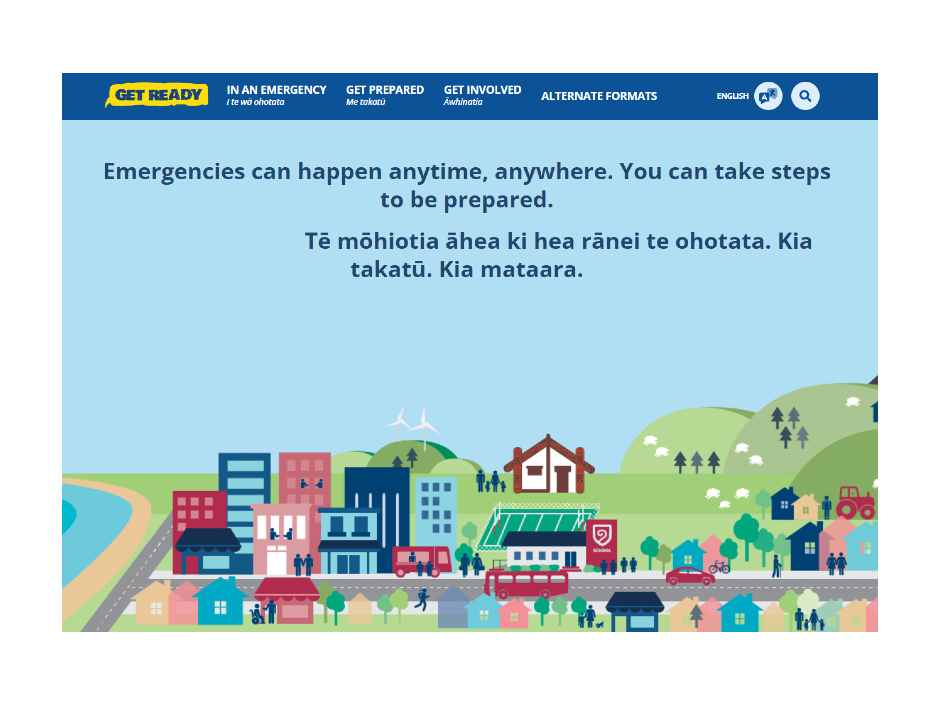
Find out more
Find this information in other languages
FInd each of the videos translated and voiced-over into 20 other languages.
-
Emergencies can happen anytime, anywhere | يمكن أن تحدث حالات الطوارئ في أي وقت وفي أي مكان
How to make an emergency plan | كيفية وضع خطة الطوارئ
What you will need in an emergency | ما سوف تحتاجه في حالة الطوارئ
What to do in an earthquake | ماذا تفعل في حالة وقع زلزال
What to do in a tsunami | ماذا تفعل عند حدوث تسونامي
What to do in a flood | ماذا تفعل عند حدوث الفيضان
What to do in a storm | ماذا تفعل عند هبوب العاصفة
What to do in a fire | ماذا تفعل في حالة الحريق
What to do during volcanic activity | ما يجب القيام به أثناء النشاط البركاني
-
紧急情况随时随地都可能发生 | Emergencies can happen anytime, anywhere
如何制定应急计划 | How to make an emergency plan
紧急事件中您需要些什么 | What you will need in an emergency
发生地震时该怎么办 | What to do in an earthquake
海啸发生时该怎么办 | What to do in a tsunami
发生洪水时该怎么办 | What to do in a flood
暴风雨时该怎么办 | What to do in a storm
-
緊急情況可能在任何時間任何地點發生 | Emergencies can happen anytime, anywhere
如何制定應急計劃 | How to make an emergency plan
緊急情況下您需要些什麼 | What you will need in an emergency
地震時該怎麼辦 | What to do in an earthquake
海嘯發生時該做什麼 | What to do in a tsunami
洪水時該做什麼 | What to do in a flood
暴風雨時該做什麼 | What to do in a storm
-
Emergencies can happen anytime, anywhere | شرایط اضطراری میتواند در هر زمان و هر مکان اتفاق افتد
How to make an emergency plan | چگونه یک برنامهٔ اضطراری تهیه کنیم
What you will need in an emergency | آنچه در مواقع اضطراری نیاز خواهید داشت
What to do in an earthquake | در هنگام زلزله چه باید کرد
What to do in a tsunami | در هنگام سونامی چه باید کرد
What to do in a flood | در هنگام سیل چه باید کرد
What to do in a storm | در هنگام طوفان چه باید کرد
What to do in a fire | در هنگام آتش سوزی چه باید کرد
What to do during volcanic activity | در زمان فعالیتهای آتشفشانی چه کار باید کرد
-
Comment élaborer un plan d’urgence | How to make an emergency plan
Ce dont vous aurez besoin en cas d’urgence | What you will need in an emergency
Que faire en cas de tremblement de terre | What to do in an earthquake
Que faire en cas de tsunami | What to do in a tsunami
Que faire en cas d’inondation | What to do in a flood
Que faire en cas de tempête | What to do in a storm
Que faire en cas d’incendie | What to do in a fire
Que faire pendant une éruption volcanique | What to do during volcanic activity
-
કટોકટી ગમે ત્યારે, ગમે ત્યાં સર્જાઈ શકે છે | Emergencies can happen anytime, anywhere
કટોકટીની યોજના કેવી રીતે બનાવવી | How to make an emergency plan
કટોકટીમાં તમારે શેની જરૂર પડશે | What you will need in an emergency
ધરતીકંપમાં શું કરવું | What to do in an earthquake
સુનામીમાં શું કરવું | What to do in a tsunami
પૂરમાં શું કરવું | What to do in a flood
તોફાનમાં શું કરવું | What to do in a storm
આગમાં શું કરવું | What to do in a fire
જ્વાળામુખીની પ્રવૃત્તિ દરમિયાન શું કરવું | What to do during volcanic activity
-
आपात स्थिति कभी भी, कहीं भी हो सकती ह | Emergencies can happen anytime, anywhere
आपातकालीन योजना कैसे बनाएं | How to make an emergency plan
आपातकालीन स्थिति में आपको किस चीज की आवश्यकता होगी | What you will need in an emergency
भूकंप में क्या करें | What to do in an earthquake
सुनामी में क्या करें | What to do in a tsunami
बाढ़ में क्या करें | What to do in a flood
तूफान में क्या करें | What to do in a storm
आग लगने पर क्या करें | What to do in a fire
ज्वालामुखी गतिविधि के दौरान क्या करें | What to do during volcanic activity
-
Keadaan darurat bisa terjadi kapan saja, di mana saja | Emergencies can happen anytime, anywhere
Bagaimana membuat rencana darurat | How to make an emergency plan
Yang Anda perlukan dalam keadaan darurat | What you will need in an emergency
Yang harus dilakukan saat terjadi gempa bumi | What to do in an earthquake
Yang harus dilakukan saat tsunami | What to do in a tsunami
Yang harus dilakukan saat banjir | What to do in a flood
Yang harus dilakukan saat badai | What to do in a storm
Yang harus dilakukan jika terjadi kebakaran | What to do in a fire
Yang harus dilakukan selama aktivitas vulkanik | What to do during volcanic activity
-
災害は時と場所を選びません | Emergencies can happen anytime, anywhere
防災対策の立て方 | How to make an emergency plan
緊急時に必要なもの | What you will need in an emergency
地震が起きたら | What to do in an earthquake
津波が起きたら | What to do in a tsunami
水害が起きたら | What to do in a flood
-
គ្រោះអាសន្នអាចកើតឡើងបានគ្រប់ពេលវេលា គ្រប់ទីកន្លែង។ | Emergencies can happen anytime, anywhere
របៀបរៀបចំផែនការក្នុងពេលមានគ្រោះអាសន្ន | How to make an emergency plan
អ្វីដែលអ្នកនឹងត្រូវការក្នុងពេលមានគ្រោះអាសន្ន | What you'll need in an emergency
អ្វីដែលត្រូវធ្វើនៅពេលមានរញ្ជួយផែនដី | What to do in an earthquake
អ្វីដែលត្រូវធ្វើនៅពេលមានរលកយក្សស៊ូណាមិ | What to do in a tsunami
អ្វីដែលត្រូវធ្វើនៅពេលមានទឹកជំនន់ | What to do in a flood
អ្វីដែលត្រូវធ្វើនៅពេលមានខ្យល់ព្យុះ | What to do in a storm
អ្វីដែលត្រូវធ្វើនៅពេលមានអគ្គីភ័យ | What to do in a fire
អ្វីដែលត្រូវធ្វើអំឡុងពេលមានបន្ទុះភ្នំភ្លើង | What to do during volcanic activity
-
비상 상황은 언제 어디서나 발생할 수 있습니다 | Emergencies can happen anytime, anywhere
비상 계획을 세우는 방법 | How to make an emergency plan
비상시 필요한 것 | What you will need in an emergency
지진 대비 및 대처 방법 | What to do in an earthquake
쓰나미 대비 및 대처 방법 | What to do in a tsunami
홍수 대비 및 대처 방법 | What to do in a flood
폭풍 대비 및 대처 방법 | What to do in a storm
-
Como elaborar um plano de emergência | How to make an emergency plan
O que você precisará em uma emergência | What you will need in an emergency
O que fazer em um terremoto | What to do in an earthquake
O que fazer em um tsunami | What to do in a tsunami
O que fazer em uma inundação | What to do in a flood
O que fazer em uma tempestade | What to do in a storm
O que fazer em um incêndio | What to do in a fire
O que fazer durante uma atividade vulcânica | What to do during volcanic activity
-
ਐਮਰਜੈਂਸੀ ਕਿਸੇ ਵੀ ਸਮੇਂ, ਕਿਤੇ ਵੀ ਹੋ ਸਕਦੀ ਹੈ | Emergencies can happen anytime, anywhere
ਐਮਰਜੈਂਸੀ ਯੋਜਨਾ ਕਿਵੇਂ ਬਣਾਈਏ | How to make an emergency plan
ਤੁਹਾਨੂੰ ਐਮਰਜੈਂਸੀ ਵਿੱਚ ਕੀ ਚਾਹੀਦਾ ਹੈ | What you will need in an emergency
ਭੂਚਾਲ ਵਿੱਚ ਕੀ ਕਰਨਾ ਹੈ | What to do in an earthquake
ਸੁਨਾਮੀ ਵਿੱਚ ਕੀ ਕਰਨਾ ਹੈ | What to do in a tsunami
ਹੜ੍ਹ ਵਿੱਚ ਕੀ ਕਰਨਾ ਹੈ | What to do in a flood
ਤੂਫਾਨ ਵਿੱਚ ਕੀ ਕਰਨਾ ਹੈ | What to do in a storm
ਅੱਗ ਵਿੱਚ ਕੀ ਕਰਨਾ ਹੈ | What to do in a fire
ਜਵਾਲਾਮੁਖੀ ਗਤੀਵਿਧੀ ਦੇ ਦੌਰਾਨ ਕੀ ਕਰਨਾ ਹੈ | What to do during volcanic activity
-
Side loo sameeyo qorshaha xaaladda degdeg ah | How to make an emergency plan
Waxaa aad u baahan doontaa xaaladda degdega ah | What you will need in an emergency
Waxaa la sameeynayo dhulgariirka | What to do in an earthquake
Waxaa lagu sameeynayo sunaamiga | What to do in a tsunami
Waxaa la sameeynayo fatahaada | What to do in a flood
Waxaa la sameeynayo duufaanta | What to do in a storm
Waxaa lagu sameeynayo dabka | What to do in a fire
Waxaa la sameeynayo inta lagu jirto shaqada foolkanada | What to do during volcanic activity
-
Cómo hacer un plan de emergencia | How to make an emergency plan
Qué necesitará en una emergencia | What you will need in an emergency
Qué hacer en caso de terremoto | What to do in an earthquake
Qué hacer en un tsunami | What to do in a tsunami
Qué hacer en una inundación | What to do in a flood
Qué hacer durante una tormenta | What to do in a storm
Qué hacer en un incendio | What to do in a fire
Qué hacer durante la actividad volcánica | What to do during volcanic activity
-
Magkaka-emerhensya anumang oras, saanman | Emergencies can happen anytime, anywhere
Paggawa ng planong pang-emerhensya | How to make an emergency plan
Ang kailangan mo sa isang emerhensya | What you will need in an emergency
Ang dapat gawin kung may lindol | What to do in an earthquake
Ang dapat gawin kung may tsunami | What to do in a tsunami
Ang dapat gawin kung may baha | What to do in a flood
Ang dapat gawin kung may bagyo | What to do in a storm
Ang dapat gawin kung may sunog | What to do in a fire
Ang dapat gawin kung may aktibidad ng bulkan | What to do during volcanic activity
-
அவசரநிலைகள் எந்நேரமும் எங்கு வேண்டுமானாலும் நிகழலாம் | Emergencies can happen anytime, anywhere
அவசரநிலை திட்டத்தை எவ்வாறு உருவாக்குவது | How to make an emergency plan
அவசரநிலையின் போது உங்களுக்கு என்னென்ன தேவை | What you will need in an emergency
நிலநடுக்கத்தின் போது என்ன செய்யவேண்டும் | What to do in an earthquake
சுனாமியின் போது என்ன செய்யவேண்டும் | What to do in a tsunami
வெள்ளத்தின் போது என்ன செய்யவேண்டும் | What to do in a flood
சூறாவளியின் போது என்ன செய்யவேண்டும் | What to do in a storm
தீ விபத்தின் போது என்ன செய்யவேண்டும் | What to do in a fire
எரிமலை சீற்றத்தின் போது என்ன செய்யவேண்டும் | What to do during volcanic activity
-
เหตุฉุกเฉินเกิดขึ้นได้ทุกที่ทุกเวลา | Emergencies can happen anytime, anywhere
จัดทำแผนฉุกเฉินอย่างไร | How to make an emergency plan
สิ่งที่ต้องมีในกรณีฉุกเฉิน | What you will need in an emergency
ต้องทำอย่างไรในกรณีแผ่นดินไหว | What to do in an earthquake
ต้องทำอย่างไรเมื่อเกิดสึนามิ | What to do in a tsunami
ต้องทำอย่างไรในสถานการณ์น้ําท่วม | What to do in a flood
ต้องทำอย่างไรเมื่อมีพายุ | What to do in a storm
ต้องทําอย่างไรเมื่อเกิดเพลิงไหม้ | What to do in a fire
ต้องทำอย่างไรเมื่อเกิดปรากฏการณ์ภูเขาไฟ | What to do during volcanic activity
-
Emergencies can happen anytime, anywhere | ہنگامی حالات کسی بھی وقت، کہیں بھی پیش آ سکتے ہیں
How to make an emergency plan | ایک ہنگامی منصوبہ کیسے بنایا جائے
What you will need in an emergency | ایمرجنسی میں آپ کو کن چیزوں کی ضرورت ہوگی
What to do in an earthquake | زلزلے میں کیا کرنا ہو گا
What to do in a tsunami | سونامی کے دوران کیا کیا جائے
What to do in a flood | سیلاب کے دوران کیا کیا جائے
What to do in a storm | طوفان کے دوران کیا کیا جائے
What to do in a fire | آگ لگںے کے دوران کیا کیا جائے
What to do during volcanic activity | آتش فشاں سرگرمی کے دوران کیا کیا جائے
-
Các tình huống khẩn cấp có thể xảy ra mọi lúc, mọi nơi | Emergencies can happen anytime, anywhere
Cách lập kế hoạch ứng phó tình huống khẩn cấp | How to make an emergency plan
Những gì bạn sẽ cần trong tình huống khẩn cấp | What you will need in an emergency
Làm gì khi xảy ra động đất | What to do in an earthquake
Làm gì khi xảy ra sóng thần | What to do in a tsunami
Làm gì khi xảy ra lũ lụt | What to do in a flood
Làm gì khi xảy ra bão | What to do in a storm
Làm gì khi xảy ra hỏa hoạn | What to do in a fire
Làm gì khi núi lửa hoạt động | What to do during volcanic activity

